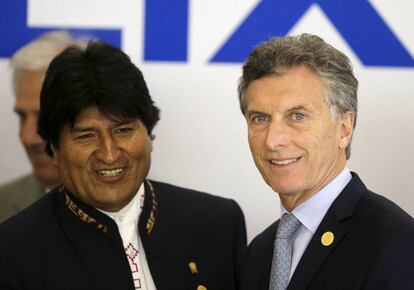Bolivia fears “wave of xenophobia” in wake of Argentina immigration laws
President Evo Morales sends high-level delegation to Buenos Aires in bid to reduce tensions

Argentinean President Mauricio Macri’s recent decision to toughen his country’s immigration laws by making it easier to expel foreigners who commit crimes and ban those with criminal records has sparked a conflict with the country’s northern neighbor, Bolivia.

Bolivian President Evo Morales, who has criticized Macri for the measures, accusing him of mimicking Donald Trump’s immigration policies, has sent a delegation to Argentina led by José Alberto Gonzáles, the president of the Bolivian Senate, in a bid to show his unhappiness and to reduce tensions.
“Bolivians’ fear is that this will unleash a wave of persecution because of the way people look, that people who come to work are pursued using the excuse of the fight against crime. There has been a wave of xenophobia, but the Argentinean government assures us that this is not the intention of the decree. The meeting was positive,” said Gonzáles after meeting with Argentina’s foreign minister, Pedro Villagra.
Bullrich insists that the government’s new legislation is not about migration, but about crime
Macri’s government says that it does not intend to stigmatize immigrants and that Argentina remains an open country – the preamble to its Constitution refers to “all men of the world who wish to dwell on Argentinean soil” – but some recent statements, particularly from Security Minister Patricia Bullrich, have heightened tensions with Bolivia, Peru and Uruguay, which all have large numbers of their citizens living in Argentina.
When Argentinean deputy Alfredo Olmedo called for a wall to be built along the border with Bolivia, Morales signaled his displeasure.
“Brother Latin American presidents: let us be a great homeland; let us not follow the migratory policies of the north. Together for our sovereignty and dignity,” he tweeted, adding: “Discriminatory policies that condemn migration and blame it for crime, drug- and people-trafficking, terrorism and a brake on the right to development are a shameful regress in the face of the rights conquered through the struggle of our peoples.”
Gonzáles, who lived for several years in Argentina as his country’s consul, met with representatives of the 1.2-million-strong Bolivian community there, who expressed their fears.
“The issue has been exaggerated. The role of the media is important, the social networks also contribute. This unsettles people. The Argentinean government is insisting that this is a measure against crime. We are trying to dispel these myths,” says Gonzáles, who has appealed to Macri’s wife, Juliana Awada, who owns a fashion brand that works with Bolivians and who has been accused of using undocumented migrants. “If you have any doubts about how Bolivians work, then ask Awada about the quality of Bolivian tailors and seamstresses,” he says.
Brother Latin American presidents: let us be a great homeland
Bolivian President Evo Morales
Gonzáles now seems to be looking to calm the situation. Nevertheless, Bolivians in Argentina are very anxious.
María Blanco, a spokeswoman for the Bolivian community living in the capital of Buenos Aires, says her compatriots are afraid that the authorities will invent excuses to deport them. “They can expel you for eight years. We are already seeing abuses by the police. Things are going to get worse. This new law revives xenophobia. My children were born here. This is their country. But they are still considered to be Bolivians – society discriminates against us.”
“The real problem is the crisis,” says Juan Vasquez of Simbiosis Cultural, an organization that represents members of Argentina’s Bolivian community. “People are worried, because there is no work. The textile sector, where most Bolivians work, is in a bad way because the country is opening up to imports. All the workshops are breaking the law to some extent. Now they can expel your for whatever reason,” he says.
Bullrich has accused Paraguayans, Bolivians and Peruvians of being involved in the drugs trade, a claim Gonzáles rebuffs. “We have official data showing that of the 39,000 prisoners in jail in Buenos Aires province, only 190 are Bolivians, and only 14 of them are in jail for drug trafficking. That is the reality.”
Bullrich insists that the government’s new legislation is not about migration, but about crime: “The law is the same as in Bolivia, exactly the same for people with criminal records or who committed crimes.”
English version by Nick Lyne.
Tu suscripción se está usando en otro dispositivo
¿Quieres añadir otro usuario a tu suscripción?
Si continúas leyendo en este dispositivo, no se podrá leer en el otro.
FlechaTu suscripción se está usando en otro dispositivo y solo puedes acceder a EL PAÍS desde un dispositivo a la vez.
Si quieres compartir tu cuenta, cambia tu suscripción a la modalidad Premium, así podrás añadir otro usuario. Cada uno accederá con su propia cuenta de email, lo que os permitirá personalizar vuestra experiencia en EL PAÍS.
¿Tienes una suscripción de empresa? Accede aquí para contratar más cuentas.
En el caso de no saber quién está usando tu cuenta, te recomendamos cambiar tu contraseña aquí.
Si decides continuar compartiendo tu cuenta, este mensaje se mostrará en tu dispositivo y en el de la otra persona que está usando tu cuenta de forma indefinida, afectando a tu experiencia de lectura. Puedes consultar aquí los términos y condiciones de la suscripción digital.








































